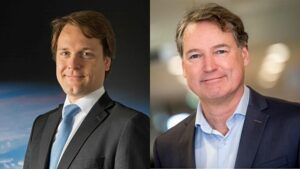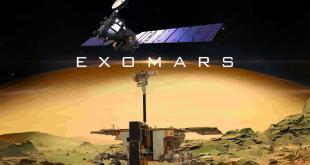by Luisa Low

During this week’s Space Café, SpaceWatch.Global publisher Torsten Kriening sat down – virtually – with the European Space Agency’s Head of Space Solutions Cornelis (Niels) Eldering and Academic Director for the Rotterdam School of Management at Erasmus University and Space for Business co-founder, Dr René Olie, to discuss how emerging education and incubator programs are helping to unlock space’s commercial potential.
Together with his team, Niels Eldering is responsible for ESA’s Space Solutions Network, which comprises ESA’s Business Incubation Centres (ESA BICs), the ESA Technology Transfer broker network, and the ESA Business Applications ambassador platform.
Dr René Olie is an Associate Professor of Strategic and International Management, researching how companies can achieve optimal integration in their cross-border operations, despite cultural and national challenges. He is also an expert in how society effects the functioning of top management, as well as how to navigate modern-day challenges facing the international business community.
So, how is business education developing a new generation of space players? Torsten talks with Niels and René to find out.
From silo to ‘slashie’ – Europe’s changing face of space
There’s no doubt that space was once a siloed industry focused on mega-projects driven by governments to bolster national interests.
The combination of technology and capital has seen that model pivot in recent years – with the barriers to entry far lower than ever before. With the right set of skills and technology, entrepreneurs and start-ups worldwide are developing low-cost, scalable, dual-use technology, changing the very face of space and those who work in it.
“Maybe what has changed in the past decade or so, is that [space] is no longer restricted to hardcore space business… space is more and more integrated in the superstructure of modern society,” said Niels.
“People outside of the space domain [now] consider space, also a benefit to them, and something that I believe a business education is very well placed at this time.”
Until recently, if you wanted to work in space, you had better go become an engineer, study physics or sign yourself up to the airforce. Now, with the industry’s increasing commercialisation, there are other ways students can enter space – and that includes business.
The study of space as an industry is being woven into business and management degrees across the globe. Space for Business has gone one step further, founding a dedicated international space program across universities in Portugal, The Netherlands and Switzerland, which aims to bridge the gap between “hard tech” and business to better equip the next generation of space professionals.
“I can tell you that no other business schools have actually ventured into this world, but that’s what makes it exciting and interesting,” said René.
“We noticed that bringing business students close to to the space industry is very helpful and gives them access to a great high-tech industry.”
“But the other way around, we’re bringing engineers from the space industry and space professors closer to business.”
“So that’s where the idea came to develop a program, which brings those two different fields together.”
Engaging current leaders
Learning about the business of space isn’t just for budding entrepreneurs and graduate students, Space for Business also works with established leaders and managers in larger companies to improve their products and offerings.
One challenges incumbents often face is becoming too welded to a particular aspect of a product or technology, then find themselves unable to scale or develop beyond their initial core offering.
“I think it’s helpful for these kind of companies to to go through such a program, and sit together with like minded people, and learn from peers, but also from business specialists,” said René.
Business for Space also works with outliers who are beginning to adapt and improve their products using modern space innovation.
“For example, automotive companies are now looking to the space technology to realise their strategic ambitions. How many more companies will realise that space may be a solution, at least if they want to compete in the long run?”
Never underestimate good, old fashioned networking
According to Niels, key components to the Business Incubation Centre are the ability to network and for participants to be connected to industrial partners – and being part of ESA, these offerings are certainly nothing to sniff at.
The program also provides for an ongoing, long-term exchange – creating a European business ecosystem that continues to reward as the sector grows and changes.
“Basically, any startup company you help today could be the supplier or customer, the investor or coach of the company, you help tomorrow. And that’s, of course, the community,” said Niels.
‘And that also applies of course, in a in a training course, where people come together, they have an assignment, they have to work on their also on their own case.
“Through that you create relationships, and you create a network. But indeed, the network doesn’t restrict itself to only the course. The course is interwoven also with practices and experiences from our ESA business incubation centres and space solution network as a whole.
“I encounter a lot of people who have not been exposed to space at all. And they all immediately have a passion – they love to be part of the game. And so I think the space community is much bigger than we realise.”
To listen to Niels Eldering and Dr Rene Olie’s insights into the business of space, you can watch the full program here
Space Café is broadcast live Tuesday at 4 pm CEST. To subscribe and get the latest on the space industry from world-leading experts visit – click here.
Luisa Low is a freelance journalist and media adviser from Sydney, Australia. She currently manages Media and Public Relations for the University of Sydney’s Faculty of Engineering.





